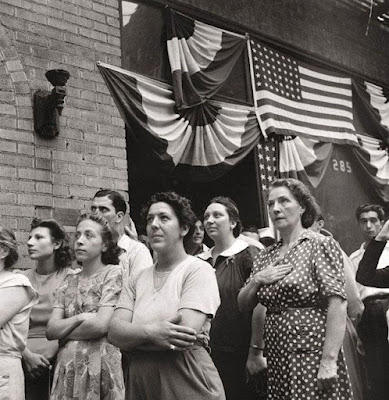 |
| Italian Americans watching a flag raising ceremony at the Feast of San Rocco in NYC, photo ca. 1942, by Marjory Collins (1912-1985) |
Submitted by Erasmo Russo
It has been jokingly said that the average Italian maintains that his fellow Italian is not authentically Italian unless he too has suffered to the same degree at the hands of the state with its poor governance and malfeasance as he himself has suffered. There is some truth in this linkage of shared suffering as an eternal bond, sufficient enough to unite the ethnos or nation, or indeed to create the nation. Those of us old enough to have lived through the Second World War or been raised with parents and grandparents who did, know well this notion. The older people often said, “you don’t know what sacrifices and misery we had in those days.” Or, “I never complain because my parents suffered more than I ever did. They came through the war.” Italians often even joke that unless you studied and passed the Italian driving test with its mechanical and road components, or have been through a grueling oral examination in an Italian school, or had to memorize more than 20 lines of Italian poems to recite aloud, you can not possibly be a “real Italian.” We may add, if you have not had to live on 800 euros a month, paid once monthly at the end of the month, had a motorino or Fiat as your first vehicle, you can not be a “real Italian.” Until recently mandatory military service was a bonding right of passage for Italian men, something most diaspora Italians did not experience. Those who remain abroad for long stretches of time often exhibit a modification of their pronunciation and even their native gestures. There is a certain reality to this. Being raised in Italy, one of course is infused with the history and culture. Diasporic communities often have children who attend the local foreign schools and coupled with their physical distance and separation from Italy, this often leads to a dissonant formation. While we are blessed with a nation state as a firm reference point and perennial font of our culture and language, there can be a significant disconnect between those who are able to be nurtured by them and those who are not. Without still living in the Patria, our diasporic communities must both remain in constant contact and travel back, or in the least, as historically happens, must successfully replicate and transmit language and culture. Further complicating matters, when one is fortunate to have a nation state, one must be continually updated because the arts, literature, and culture in general evolve and change and that very font or source becomes more complex. In assimilationist host countries our children are quickly pressured to spend more time on notions such as the American “our founding fathers” or the French “our ancestors, the Gauls,” both equally rather silly fictions employed to create a shared foundational myth around which to rally diverse unrelated peoples. Our culture and civilization should not be filtered through translation, but lived organically. At the same time, the natural diversity of the Italian regions and islands is a vast richness and there should be many ways of “doing diaspora.”
 |
| Prince Line poster depicting steamship departing the Bay of Naples for New York |
 |
| The personification of Italy standing between the old and new worlds |
 |
| A crude propaganda advertisement from the 1942 Honolulu Advertiser |
The proper posture should be one of peaceful, even grateful attitude, coexistence with the host country, but while maintaining a type of distacco, or separation or aloofness. It is healthy to recognize our otherness and remember we are indeed different. We can respect our host’s ways and laws and rules, but we don’t have to become our hosts. The notion that in order to “succeed” we must “change,” “evolve” or generally mimic our neighbors is always a losing strategy. Doing so renders one a poor copy of the host and lesser original. We risk falling into macaronic vignettes.
 |
| Still going strong: The San Rocco Society in New York City are preparing to celebrate their 134th Annual Feast of San Rocco this August in Little Italy |









